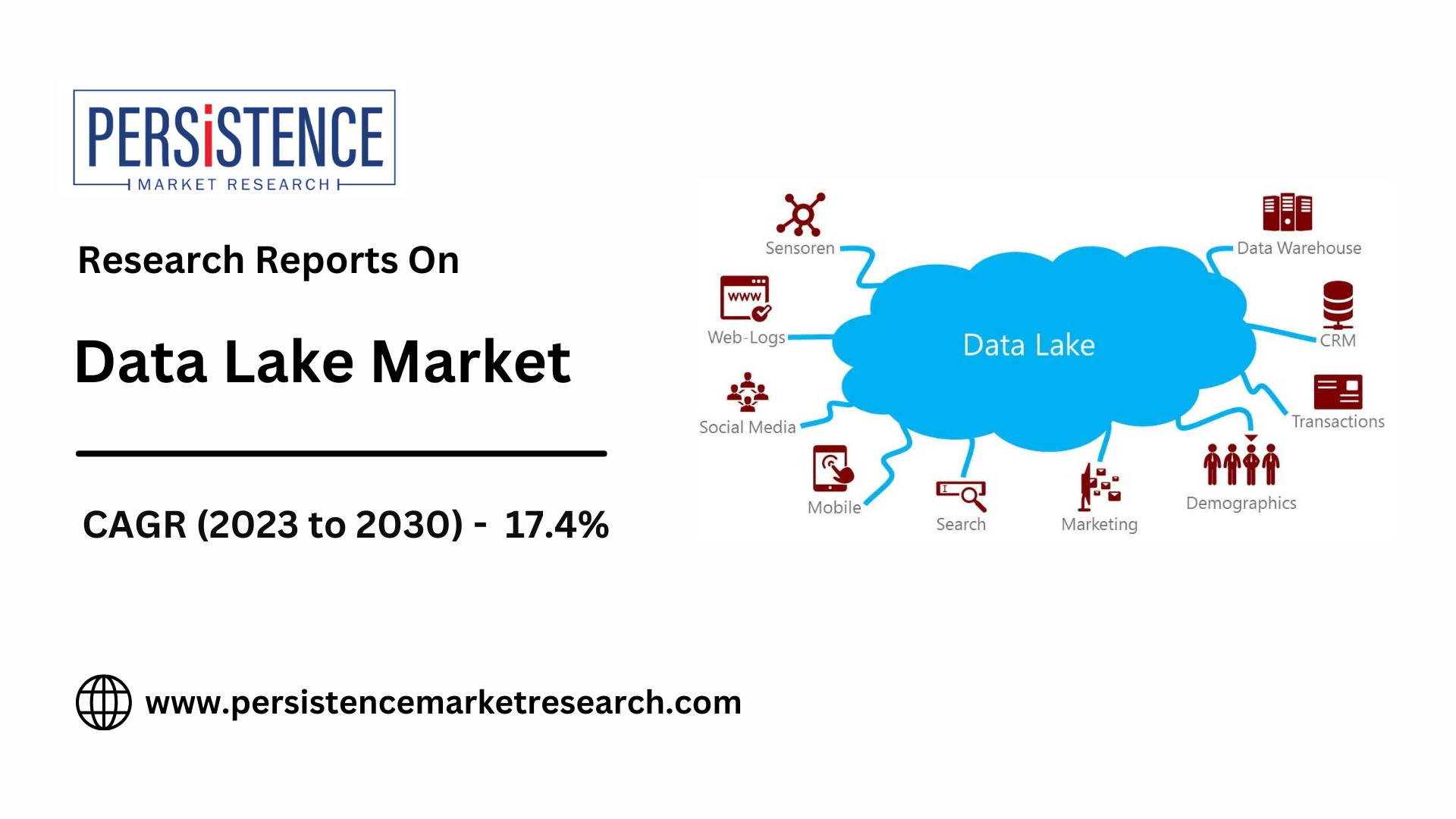Asia Pacific Emerges as Fastest-Growing Data Lake Market

Strong 8k brings an ultra-HD IPTV experience to your living room and your pocket.
The global data lake market is expected to grow significantly, with a projected CAGR of 17.4%, increasing from US$ 13.4 billion in 2023 to US$ 41.2 billion by 2030. Data lakes offer enterprises a centralized, scalable repository for storing both structured and unstructured data, enabling efficient data analysis and decision-making through technologies like machine learning and big data analytics. As the demand for cloud computing services grows and data volumes rise, the need for flexible, cost-effective storage solutions is driving market expansion. Additionally, advancements in data processing technologies, such as Hadoop and Apache Spark, further enhance the appeal of data lakes globally.
The Asia Pacific (APAC) region is rapidly emerging as the fastest-growing market for data lakes, driven by the surge in digital transformation, the proliferation of Internet of Things (IoT) devices, and the expanding need for big data analytics. With countries like China, India, Japan, and South Korea at the forefront of technological innovation, the APAC region presents immense growth potential for data lake solutions. As organizations across various sectors adopt data-driven strategies to remain competitive, the demand for scalable, flexible, and efficient data storage and processing solutions is set to rise, positioning the data lake market as a key enabler of this transformation.
In this article, we explore the factors driving the rapid growth of the data lake market in Asia Pacific, the opportunities it presents for businesses, and the challenges that come with implementing these innovative technologies.
1. The Accelerating Pace of Digital Transformation in APAC
Digital transformation is one of the key drivers behind the rapid adoption of data lakes in the APAC region. With increasing digitization across industries like retail, finance, manufacturing, and healthcare, businesses are generating vast amounts of structured and unstructured data. To effectively manage and leverage this data for better decision-making, companies are turning to data lakes as a scalable solution.
In countries like India and China, industries are increasingly investing in digital technologies to improve operational efficiency and customer experience. As organizations embrace data-driven business models, data lakes offer an ideal platform to store, analyze, and gain insights from diverse datasets. Moreover, the rise of smart cities and IoT applications across the region is further boosting the demand for advanced data management solutions like data lakes.
2. IoT and Big Data Analytics Driving Demand
Asia Pacific is witnessing an IoT revolution, with millions of connected devices generating enormous volumes of data every day. Industries such as manufacturing, logistics, healthcare, and automotive are embracing IoT to improve efficiency, enhance customer experiences, and optimize operations. This explosion of connected devices creates massive amounts of structured and unstructured data, which needs to be stored, processed, and analyzed effectively.
Data lakes are ideally suited for managing big data generated by IoT devices. They can handle diverse data types, including sensor data, social media content, video streams, and logs, which traditional relational databases are not equipped to manage. This makes data lakes the preferred solution for businesses looking to harness the full potential of IoT data and gain valuable insights for predictive analytics, real-time decision-making, and automation.
3. The Role of Cloud Adoption in Data Lake Growth
The widespread adoption of cloud computing is a significant factor driving the rapid growth of the data lake market in the APAC region. Cloud platforms, such as Amazon Web Services (AWS), Microsoft Azure, and Google Cloud, offer powerful, scalable, and cost-effective data lake solutions that allow businesses to store and process vast amounts of data without the need for extensive on-premise infrastructure.
Cloud-based data lakes enable organizations to scale their data storage needs quickly and flexibly, accommodating the ever-growing volumes of data generated by digital transformation and IoT adoption. Additionally, cloud providers offer integrated services for data processing, analytics, and machine learning, which further enhance the value of data lakes for businesses seeking to unlock insights from their data. This seamless integration between cloud infrastructure and data lakes has made cloud adoption one of the main enablers of data lake growth in APAC.
4. Government Initiatives and Industry Adoption
Governments across APAC are actively promoting initiatives to drive digital transformation and the adoption of advanced technologies such as big data analytics, AI, and cloud computing. In China, for example, the government’s “Made in China 2025” initiative is focused on fostering innovation in industries like manufacturing and technology, which are increasingly reliant on data lakes to process and analyze vast amounts of data.
Similarly, India’s push for a Digital India initiative has led to increased investment in digital infrastructure, further promoting the need for scalable data storage and analytics solutions. These government-led initiatives are creating a favorable environment for the growth of data lakes, with businesses increasingly adopting these solutions to stay competitive in the digital age.
Moreover, key industries in APAC, such as telecommunications, retail, and healthcare, are early adopters of data lake technology. Telecommunications companies in the region, for instance, are using data lakes to analyze customer data, optimize network performance, and deliver personalized services. In healthcare, data lakes are being leveraged to store and analyze patient records, medical images, and genomic data, facilitating better patient care and outcomes.
5. Key Markets Driving Data Lake Adoption in APAC
China: China’s rapidly growing economy, coupled with its status as a global leader in technology and innovation, has positioned the country as a major driver of the data lake market in APAC. China’s burgeoning e-commerce, manufacturing, and technology sectors are generating massive volumes of data that require advanced storage and analytics solutions. Moreover, government initiatives like the “Smart City” program and the rise of 5G technology are fueling the demand for scalable data lakes to manage data generated by connected devices and systems.
India: India’s tech-driven growth is propelling the demand for data lakes. As one of the fastest-growing economies in the world, India is experiencing an explosion in digital data, particularly in sectors like e-commerce, banking, and healthcare. The government’s Digital India initiative, combined with the rise of mobile internet penetration and cloud adoption, is creating a favorable environment for the growth of data lake solutions in the region. Indian businesses are increasingly recognizing the need for advanced data management platforms like data lakes to remain competitive in the digital economy.
Japan and South Korea: Both Japan and South Korea are known for their technological prowess and advanced manufacturing industries, making them significant markets for data lakes. These countries are leveraging data lakes to store and analyze data generated by IoT devices in sectors like automotive, smart cities, and manufacturing. Furthermore, the rapid adoption of cloud computing is driving the growth of data lakes in these countries, with businesses seeking scalable, flexible, and secure data management solutions.
6. Challenges in Data Lake Adoption in APAC
Despite the rapid growth and adoption of data lakes in APAC, businesses in the region face several challenges when implementing these solutions:
Data Governance and Quality Control: One of the key challenges in the adoption of data lakes is ensuring proper data governance and maintaining data quality. Without effective governance practices, data lakes can become chaotic repositories of raw data, making it difficult to extract actionable insights. Organizations must implement robust data governance frameworks to ensure that data stored in lakes is accurate, consistent, and accessible for analysis.
Data Integration: Integrating data from diverse sources can be complex, particularly when dealing with unstructured data. Businesses need to invest in data processing and transformation tools to ensure that data lakes are properly integrated with existing systems and can deliver meaningful insights.
Security and Compliance: As businesses store vast amounts of sensitive data in data lakes, security and compliance become critical concerns. Organizations must implement strong data security measures, such as encryption and access control, to protect against data breaches. Moreover, businesses in APAC must comply with region-specific regulations, such as China’s Cybersecurity Law and India’s Data Protection Bill, when implementing data lakes.
7. Future Outlook: A Data-Driven APAC
The data lake market in APAC is poised for continued growth, with new technologies and applications emerging across industries. As IoT, AI, and machine learning continue to evolve, data lakes will become increasingly integral to the region’s digital transformation journey. Additionally, as more businesses adopt cloud computing and big data analytics, the demand for scalable and flexible data storage solutions will only intensify.
In the coming years, APAC will continue to be a hotbed of innovation, with data lakes playing a key role in driving insights, improving decision-making, and enhancing operational efficiency across sectors.
Conclusion
Asia Pacific is set to become the fastest-growing market for data lakes, driven by the rapid pace of digital transformation, the explosion of IoT data, and the widespread adoption of cloud technologies. While challenges such as data governance, integration, and security remain, the opportunities for businesses to leverage data lakes for competitive advantage are immense. As organizations across the region increasingly adopt data-driven strategies, data lakes will play a pivotal role in shaping the future of business intelligence and analytics in APAC.
Note: IndiBlogHub features both user-submitted and editorial content. We do not verify third-party contributions. Read our Disclaimer and Privacy Policyfor details.







